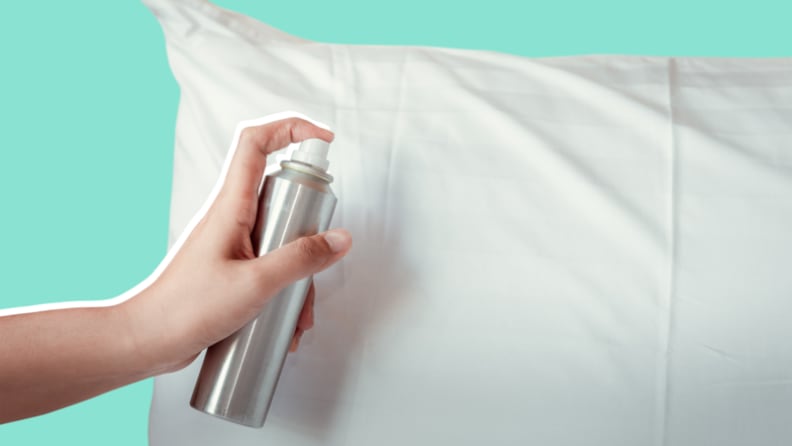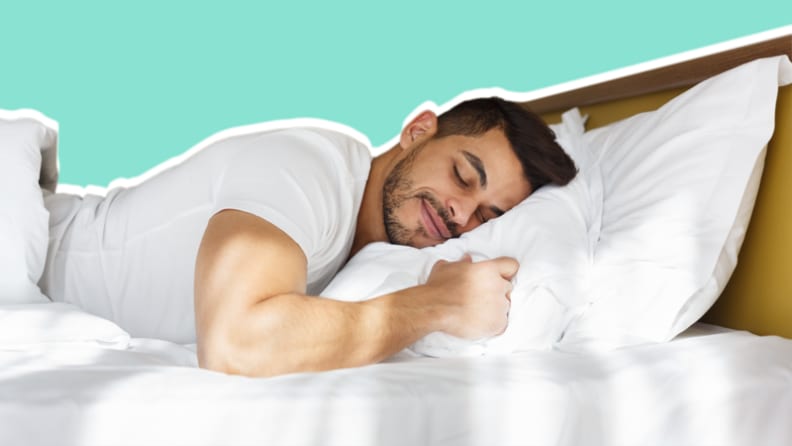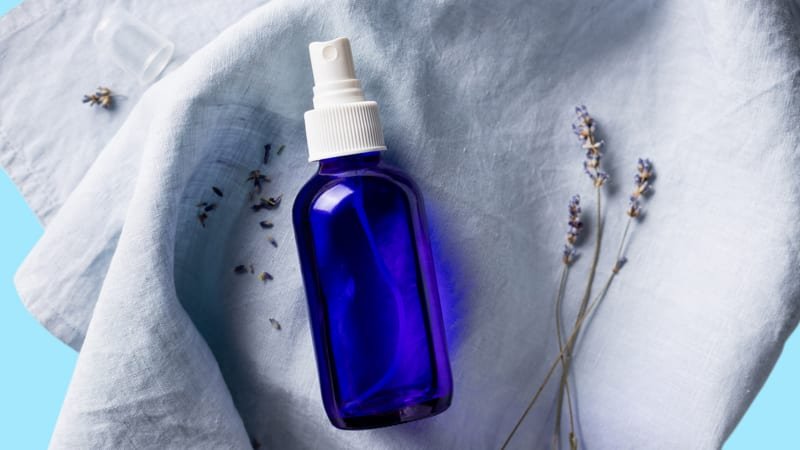There are many factors that can cause poor sleep, from what you ate during the day to the type of pillow you use. Obviously, the first big step to getting a good night’s sleep is falling asleep. But having trouble falling asleep can range from an occasional annoyance to a nightly problem. According to the American Sleep Association, approximately 50 to 70 million American adults struggle to sleep.
Over the last year, I’ve explored several ways to help me fall asleep more easily. I’ve tried doing certain exercise routines, listening to the sound of rain or white noise, and reducing my exposure to blue light from my screens at night. But there’s one strange method that hadn’t even popped up on my radar until recently: pillow mists. These water-based fragrance sprays are like an extension of aromatherapy. But the more I read about and researched different products, the more I wondered if pillow mists actually have any effect on helping me fall asleep, or if it’s all placebo.
What is Pillow Mist and what effects does it supposedly have?

Credit: Reviewed / Getty Images / 12963734
The scent of Pillow Mist spreads through the air and comes into direct contact with your skin.
Pillow mist is essentially perfume for your pillow. The spray contains scents associated with relaxation and sleep, most famously lavender. Aromatherapy has a long history in different cultures, and its benefits include improving sleep, relieving joint and muscle pain, and reducing anxiety and stress. Aromatherapy techniques range from essential oil diffusers to bath bombs. Pillow mist uses many of the same natural plants and herbs, but is sprayed directly onto the pillow before sleep. This means that users of pillow mist come into direct contact with the mist and inhale the mist throughout the night.
But what’s the science behind it? “These plants contain certain chemicals that actually help stimulate the parasympathetic nervous system,” says Yishan Xu, PhD, a licensed clinical psychologist and sleep expert at Mind & Body Garden Psychology Inc., based in Los Altos, California. Stimulating the parasympathetic nervous system returns us to a state of calm and comfort, which counters the sympathetic nervous system, the network of nervous systems that activates our fight-or-flight response and directs our response to danger, she says. Scents such as lavender do this by blocking the release of acetylcholine, a chemical associated with our alertness and focus. “By suppressing this chemical that helps keep us alert, these scents can induce a calming effect,” says Dr. Xu.
What are the downsides to pillow mists?

Credit: Reviewed / Getty Images / Prostock-Studio
Besides pillow mist, there are other ways to help you relax before bed.
Some pillow mists contain ingredients other than natural essential oils and fragrances. It’s best to avoid these mists, especially if you’re not sure what the ingredients are. Similarly, some brands add proprietary ingredients to their pillow mists that are unnatural or overly strong. These ingredients can disrupt your sleep and cause discomfort. Asking the manufacturer what’s in their pillow mists is the best way to determine if the one you’re using contains anything unpleasant.
Direct contact with pillow mists can also have skin care and health effects. “Essential oils have many benefits, but some people who use them may not be aware of them. [directly on their skin] This can cause irritation,” explains Freya Meyer, MD, a dermatologist at the Boston Dermatology Institute.
If you put pillow mist on your pillowcase and sleep with it overnight, the chemicals can be absorbed through prolonged contact with your skin, which can cause problems for people with particularly sensitive skin, says Meyer. And this can happen regardless of the ingredients in the pillow mist. “Some people have no problems using ‘natural’ pillow mists with essential oils, but just because they’re natural doesn’t mean they’re harmless,” she says.
If you still love the scent, try spraying it into the air in your room before bed or using an essential oil diffuser like our favorite, the Airomé Serenity Diffuser , to diffuse the scent without applying it directly to your skin.
What can I use instead of pillow mist to improve my sleep?
As with any method to promote sleep, Xu says that constant use of a pillow mist shouldn’t be seen as a silver bullet: “These are all meant to help you relax, but to sleep better, you really need to change the way you think.”
The quality and consistency of your sleep depends on how deliberate you are with your evening routine. This can include avoiding exposure to blue light and technology close to bedtime and making sure you regularly set aside time to unwind after work or a busy day. It can also mean re-evaluating your bedroom environment to make it most conducive to sleep. This can include keeping your room dark and quiet, with a comfortably cool temperature.
About Oil Diffusers, Aromatherapy and Relaxation
Let Reviewed’s product experts help you with all your shopping needs. Follow Reviewed on Facebook. twitterInstagram, TikTok, and Flipboard for the latest deals, product reviews, and more.
Prices were accurate at the time of publishing this article but may change over time.

